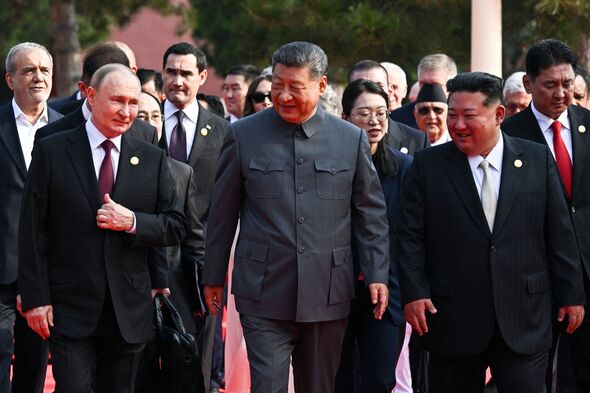Science
Scientist Debunks Xi and Putin’s Claims on Human Lifespan

Last week, during a military parade in Beijing, Chinese President Xi Jinping made significant claims regarding human longevity in a conversation with Russian President Vladimir Putin. Caught unaware by a microphone, Xi suggested that advances in biotechnology could allow humans to live to 150 years or longer. Putin echoed this sentiment, stating that developments in organ transplantation could lead to “immortality.” However, experts have quickly dismissed these assertions as “unfounded.”
According to James Markmann, the executive council president at the American Society of Transplant Surgeons, there is no scientific basis for the assertion that organ transplantation could extend human life to such an extreme. “There is currently no evidence suggesting that living to 150 years of age is possible through organ transplantation,” he stated. He emphasized that while interest in aging research is growing, the idea that a person could significantly prolong their lifespan through organ transplants is misleading.
The conversation between Xi and Putin reflects a broader trend in both Beijing and Moscow, where substantial investments are being made in anti-aging research. The Kremlin has focused on studying cellular degeneration, cognitive decline, and immune system enhancement. Meanwhile, Beijing has allocated millions to pursue innovative therapies, including nanotechnology for hydrogen delivery and compounds like betaine and lithocholic acid, aimed at slowing aging and improving quality of life in later years.
Despite these investments, Markmann reiterated that the notion of a sustainable supply of organs for indefinite life extension is not feasible. “The concerning idea here is that there is a surplus of organs available that can consistently be replenished for a single individual to prolong their life; this is simply not the case,” he said.
The quest for immortality is not a new phenomenon. Throughout history, figures from the wealthy elite have sought ways to extend their life. From the ancient Egyptians mummifying their bodies to ensure a place in the afterlife to Qin Shi Huang, the first emperor of China and his Terracotta Army, leaders have long attempted to defy the natural limits of life.
In contemporary times, a rising trend among tech leaders, particularly in Silicon Valley, aims to push these boundaries further through practices like “biohacking” and cryonics. These efforts represent a modern iteration of humanity’s age-old pursuit of eternal life.
Elizabeth Wishnick, a senior research scientist at the Center for Naval Analyses, commented on the motivations behind this pursuit. “For billionaires and leaders who have accomplished much, the human body becomes just another frontier to explore,” she said, adding that the desire to extend life is logical for those who feel they have no limits.
As both Xi and Putin continue to invest in the science of longevity, the scientific community remains skeptical about the claims of achieving a lifespan of 150 years. The discourse surrounding human longevity is likely to evolve, but for now, it remains grounded in scientific realities rather than the optimistic projections of leaders.
-

 Entertainment2 months ago
Entertainment2 months agoIconic 90s TV Show House Hits Market for £1.1 Million
-

 Lifestyle4 months ago
Lifestyle4 months agoMilk Bank Urges Mothers to Donate for Premature Babies’ Health
-

 Sports3 months ago
Sports3 months agoAlessia Russo Signs Long-Term Deal with Arsenal Ahead of WSL Season
-

 Lifestyle4 months ago
Lifestyle4 months agoShoppers Flock to Discounted Neck Pillow on Amazon for Travel Comfort
-

 Politics4 months ago
Politics4 months agoMuseums Body Critiques EHRC Proposals on Gender Facilities
-

 Business4 months ago
Business4 months agoTrump Visits Europe: Business, Politics, or Leisure?
-

 Lifestyle4 months ago
Lifestyle4 months agoJapanese Teen Sorato Shimizu Breaks U18 100m Record in 10 Seconds
-

 Politics4 months ago
Politics4 months agoCouple Shares Inspiring Love Story Defying Height Stereotypes
-

 World4 months ago
World4 months agoAnglian Water Raises Concerns Over Proposed AI Data Centre
-

 Sports4 months ago
Sports4 months agoBournemouth Dominates Everton with 3-0 Victory in Premier League Summer Series
-

 World4 months ago
World4 months agoWreckage of Missing Russian Passenger Plane Discovered in Flames
-

 Lifestyle4 months ago
Lifestyle4 months agoShoppers Rave About Roman’s £42 Midi Dress, Calling It ‘Elegant’









